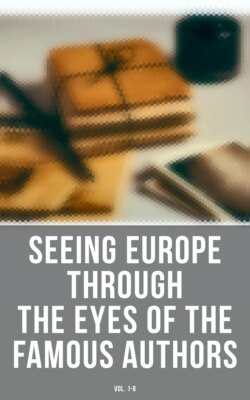Читать книгу Seeing Europe through the Eyes of the Famous Authors (Vol. 1-8) - Генри Джеймс - Страница 43
На сайте Литреса книга снята с продажи.
EATON HALL1 By Nathaniel Hawthorne
ОглавлениеTable of Contents
The Church of St. John is outside of the city walls of Chester. Entering the East gate, we walked awhile under the Rows, bought our tickets for Eaton Hall and its gardens, and likewise some playthings for the children; for this old city of Chester seems to me to possess an unusual number of toy-shops. Finally we took a cab, and drove to the Hall, about four miles distant, nearly the whole of the way lying through the wooded Park. There are many sorts of trees, making up a wilderness, which looked not unlike the woods of our own Concord, only less wild. The English oak is not a handsome tree, being short and sturdy, with a round, thick mass of foliage, lying all within its own bounds. It was a showery day. Had there been any sunshine, there might doubtless have been many beautiful effects of light and shadow in these woods. We saw one or two herds of deer, quietly feeding, a hundred yards or so distant. They appeared to be somewhat wilder than cattle, but, I think, not much wilder than sheep. Their ancestors have probably been in a half-domesticated state, receiving food at the hands of man, in winter, for centuries. There is a kind of poetry in this, quite as much as if they were really wild deer, such as their forefathers were, when Hugh Lupus used to hunt them.
Our miserable cab drew up at the steps of Eaton Hall, and, ascending under the portico, the door swung silently open, and we were received very civilly by two old men—one, a tall footman in livery; the other, of higher grade, in plain clothes. The entrance-hall is very spacious, and the floor is tessellated or somehow inlaid with marble. There was statuary in marble on the floor, and in niches stood several figures in antique armor, of various dates; some with lances, and others with battle-axes and swords. There was a two-handed sword, as much as six feet long; but not nearly so ponderous as I have supposed this kind of weapon to be, from reading of it. I could easily have brandished it.
The plainly drest old man now led us into a long corridor, which goes, I think, the whole length of the house, about five hundred feet, arched all the way, and lengthened interminably by a looking-glass at the end, in which I saw our own party approaching like a party of strangers. But I have so often seen this effect produced in dry-goods stores and elsewhere, that I was not much imprest. There were family portraits and other pictures, and likewise pieces of statuary, along this arched corridor; and it communicated with a chapel with a scriptural altar-piece, copied from Rubens, and a picture of St. Michael and the Dragon, and two, or perhaps three, richly painted windows. Everything here is entirely new and fresh, this part having been repaired, and never yet inhabited by the family. This brand-newness makes it much less effective than if it had been lived in; and I felt pretty much as if I were strolling through any other renewed house. After all, the utmost force of man can do positively very little toward making grand things or beautiful things. The imagination can do so much more, merely on shutting one's eyes, that the actual effect seems meager; so that a new house, unassociated with the past, is exceedingly unsatisfactory, especially when you have heard that the wealth and skill of man has here done its best. Besides, the rooms, as we saw them, did not look by any means their best, the carpets not being down, and the furniture being covered with protective envelops. However, rooms can not be seen to advantage by daylight; it being altogether essential to the effect, that they should be illuminated by artificial light, which takes them somewhat out of the region of bare reality. Nevertheless, there was undoubtedly great splendor—for the details of which I refer to the guide-book. Among the family portraits, there was one of a lady famous for her beautiful hand; and she was holding it up to notice in the funniest way—and very beautiful it certainly was. The private apartments of the family were not shown us. I should think it impossible for the owner of this house to imbue it with his personality to such a degree as to feel it to be his home. It must be like a small lobster in a shell much too large for him.
After seeing what was to be seen of the rooms, we visited the gardens, in which are noble conservatories and hot-houses, containing all manner of rare and beautiful flowers, and tropical fruits. I noticed some large pines, looking as if they were really made of gold. The gardener (under-gardener I suppose he was) who showed this part of the spectacle was very intelligent as well as kindly, and seemed to take an interest in his business. He gave S—— a purple everlasting flower, which will endure a great many years, as a memento of our visit to Eaton Hall. Finally, we took a view of the front of the edifice, which is very fine, and much more satisfactory than the interior—and returned to Chester.
1 From "English Note Books." By permission of, and by arrangement with, the publishers of Hawthorne's works, Houghton, Mifflin Co. Copyright, 1870 and 1898.]
